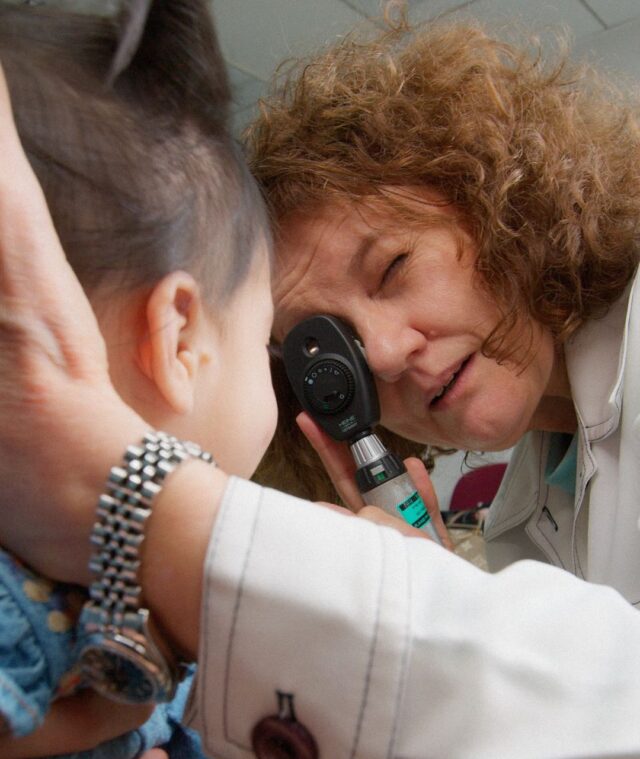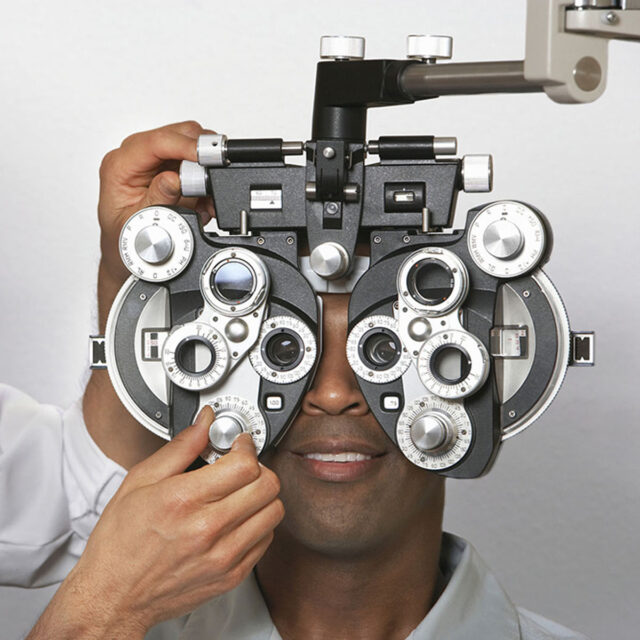Thyroid eye disease is an autoimmune disorder that causes damage to the tissues of the eye. According to a study published in Transactions of the American Ophthalmological Society in 1994, TED is a rare disease – the incidence rate is approximately 19 out of 100,000 people.
Here, our eye specialists in Dubai discuss essential things you need to know about this disease.
What is thyroid eye disease (TED)?
Previously known as Graves’ eye disease, Graves’ orbitopathy, Graves’ ophthalmopathy, thyroid eye disease is an eye disorder typically characterized by progressive inflammation or swelling and damage to the tissues (muscles along with fatty and connective tissues) surrounding the eye.
As mentioned earlier, TED is an immune system disorder. The human immune system’s function is to protect the body from germs and other things that could make a person sick. In a person with TED, their body mistakenly sees the tissues in and around the eyes as harmful foreign invaders – as a response, the immune system sends out antibodies to attack these surrounding tissues.
What are the common symptoms pointing to thyroid eye disease?
Having bulging eyes (proptosis) is one of the tell-tale signs of TED. The antibodies sent by the immune system to attack the muscles, fat and tissue in and around the eyes cause this area to puff up. If there is excessive swelling, a person with TED may not be able to close their eyes.
In addition to bulging eyes, other common thyroid eye disease symptoms include:
- Eyelid retraction
- Redness in the whites of the eyes
- A gritty, irritated feeling, as if there is dirt in the eye
- Dry or watery eyes
- Pressure and pain in the eyes during movement
- A kind of “stare”
- Sensitivity to light
- Double vision (diplopia)
These symptoms could affect one or both eyes.
While most people may observe mild symptoms of TED, for about 3% to 5% of people with the disease, the symptoms can be severe and may even include vision loss.
Thyroid eye disease has two phases:
- Active or Inflammatory Phase: This can last for months up to three years.
- Inactive or Stable Phase: This is the period that follows once the inflammation has stopped.
People with TED may also experience the disease for varying lengths of time. For some, the inflammation may last between six months and two years, while others may endure lingering symptoms even after the swelling has gone down.
What causes thyroid eye disease?
Medical experts cannot identify the specific factors that trigger the immune system to affect the tissues around the eyes in this manner.
However, it is commonly agreed upon in the medical community that TED often occurs as part of Graves’ disease, an immune disorder that affects the thyroid and often the skin and eyes.
Graves’ disease causes the body to attack the thyroid gland (a butterfly-shaped gland located at the base of the neck). The thyroid is part of the endocrine system, a network of glands secreting hormones that regulate the body’s metabolism or important chemical processes.
The attack on the thyroid commonly causes the gland to produce excessive thyroid hormones (a condition called hyperthyroidism). Less often, Graves’ disease can also cause the thyroid to release fewer hormones (a condition called hypothyroidism). People with either illness can experience thyroid eye disease (although Graves’ disease cannot be considered the cause of TED – the two disorders just often emerge simultaneously).
Who is commonly affected by thyroid eye disease?
A person with Graves’ disease has a higher risk of getting TED if they are female, smoke, have specific genetic factors, and receive radioiodine treatment.
People without Graves’ disease can also get TED. It happens more often in:
- Women than in men
- People around 43 years old (this is the median age of being diagnosed with TED, but it can also be diagnosed earlier or later)
- People with family members with TED
- People with low levels of selenium in their blood
Is thyroid eye disease contagious?
No, you cannot catch TED from another person, and you cannot transmit it to someone else if you have it.
Can thyroid eye disease be prevented?
There is usually nothing that can be done to stop a person from getting TED.
How is thyroid eye disease diagnosed?
A healthcare provider can perform a physical eye exam, checking your eyes and eyelids. If they think you may have TED, they typically order blood tests to determine if your antibodies and thyroid hormone levels are too high or low.
Can thyroid eye disease be cured?
For mild cases of TED, the condition may resolve on its own. For people with more severe cases, they may need to undergo a combination of therapies.
Recommended thyroid eye disease treatments and management methods include:
1. Using over-the-counter medication
- Eye drops (except the type that removes eye redness)
- Selenium supplements
- Aloe vera juice (to reduce inflammation)
2. Taking prescription medication
- Teprotumumab (Tepezza), a medicine specifically available for people with thyroid eye disease
- Anti-inflammatory drugs like prednisone
- Other systemic steroids (or rituximab)
3. Undergoing surgery
- Eye muscle surgery can help move the eye muscles and correct double vision. A patient may need to undergo more than one operation.
- Eyelid surgery can ensure that the cornea is covered (TED causes tight eyelids that fail to come down completely and bottom lids that cannot come up, which can damage the cornea).
- Orbital decompression surgery removes excess tissue or makes the eye socket larger; this can help relieve pressure on the optic nerve and reduces eye bulge.
4. Making lifestyle changes
- Stop smoking (for those who smoke).
- Wear sunglasses and eyeglasses with prisms that help reduce double vision.
- Use cool compresses on the eyes.
- Tape eyelids shut while sleeping.
- Make sure that your head is more elevated than your body when lying down.
- Visiting your health care provider regularly to keep your thyroid hormone levels in check.
Seek Advice from the Professionals
The outlook for people with thyroid eye disease is generally positive. Get in touch with Gulf Family Clinic today for a consultation and to get helpful tips on maintaining your overall eye health.








